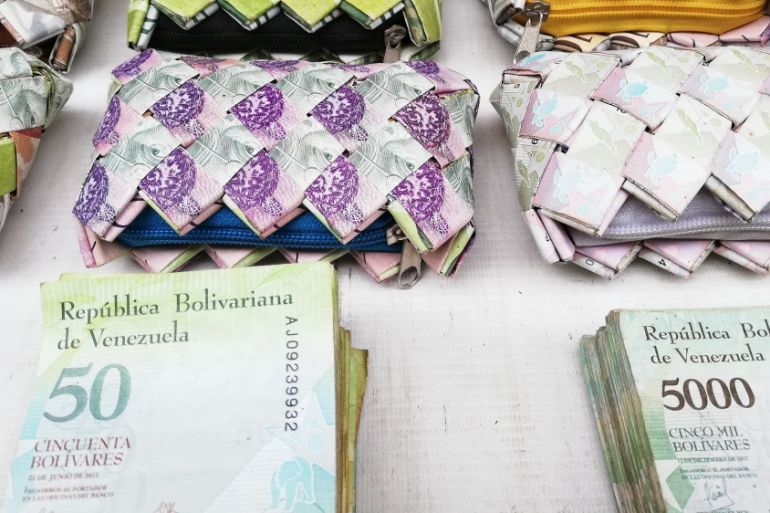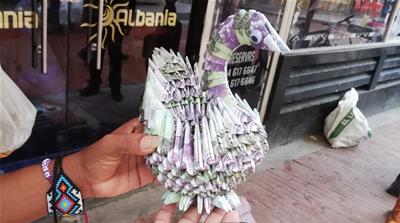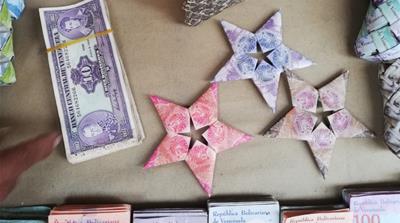Venezuela’s currency: Worth more as craft paper than as money
Crafts made from devalued money underscore the creative ways Venezuelans extract value from their decimated currency.

Santa Marta, Colombia – Along the cobblestoned streets of the coastal city of Santa Marta, demand for bolivares from Venezuela is skyrocketing, but not for the bills’ monetary value.
Instead of using his homeland’s money to pay for daily essentials in his native country, Venezuelan immigrant Hector Cordero weaves the currency into wallets and purses, which he sells to tourists in Colombia. His artful crafts underscore the creative methods that Venezuelans are using to extract value from a currency that – amid skyrocketing inflation – many consider worthless.
Keep reading
list of 4 itemsWhy is Germany maintaining economic ties with China?
Behind India’s Manipur conflict: A tale of drugs, armed groups and politics
China’s economy beats expectations, growing 5.3 percent in first quarter
“These bolivares soberanos notes are worth nothing,” Cordero, who is from Caracas, told Al Jazeera. “The notes I use are not circulating any more since last year.”

Cordero uses about 70 notes of 100 bolivares each to handcraft a small coin purse, or 100 of the notes to make a larger wallet. A handbag can take up to 1,200 notes to produce. All in all, the artist incorporates 16 different denominations of Venezuelan currency into his crafts, many of them the discontinued bolivares soberanos.
Cordero sells wallets made from hundreds or even thousands of bills of the now valueless currency for about $8; the handbags go for about $12. He says most of his clients are European and North American tourists – people who want to take home a piece of what was once one of the strongest economies in South America.
He learned his technique by watching others in the streets of Caracas and by studying dozens of YouTube tutorials uploaded by fellow Venezuelans to teach people how to make what has become known as origami venezolano.
“When I run out of bolivares, my brother goes to Venezuela and brings more notes,” Cordero said. “People have a lot of these notes and we buy them. We give them what they ask for.” He explained that people in Venezuela exchange unworthy bolivares by the weight for other forms of currency – usually United States dollars – or for food. People also make the swap for high-denomination bolivares – bills that still hold some dwindling value. The crafts help Cordero and his family get by in their temporary home in Colombia, but he dreams of returning to Venezuela some day.
“I hope things change in Venezuela. I want to go back. There’s nothing like our country and I don’t feel comfortable living in another country,” he said. “The government has let everything break down. I’m only waiting for problems to get solved so I can go back to Venezuela.”
Hyperinflation
The Venezuelan government does not publish data related to inflation, but the Finance Commission of the opposition-controlled National Assembly calculated that inflation for October 2019 was 20.7 percent and that cumulative inflation for 2019 was 4,035 percent. Even so, those numbers may be very conservative. The International Monetary Fund estimates that inflation in Venezuela this year will reach 200,000 percent – and that the economy will contract by 35 percent.
“Venezuelans first suffered the expropriation wave and now the hyperinflation hurricane, which has devastated private enterprise,” Congressman Angel Alvarado said on November 14.
Few in Venezuela use bolivares to buy goods or services. Most people have turned to US dollars, euros, cryptocurrencies or bartering to survive.

The Venezuelan government, headed by President Nicolas Maduro, is well aware of the situation. During a November 17 interview with former Vice President Jose Rangel – who served during the era of President Hugo Chavez – Maduro said that all economies around the world use the US dollar for different transactions.
The president also recognised that in some sectors of the Venezuelan economy, such as the oil sector, that had been the case as well. However, due to hyperinflation, the trend of using US dollars in the streets instead of bolivares is becoming unstoppable.
“This process that they call dollarisation can be used for the recovery and deployment of the country’s productive forces and the functioning of the economy,” Maduro said.
Exodus fuels implicit dollarisation?
“Venezuela has gradually dollarised with even supermarket transactions happening in foreign currency, and many employees are being paid in US dollars or euros. However, a substantial portion of the country still has no access to foreign currency, especially the least fortunate,” Daniel Di Martino, a US-based economic analyst and a spokesman for the US chapter of the political movement Vente Venezuela (Come Venezuela), told Al Jazeera.
Those least fortunate often choose to leave Venezuela. Craft seller Cordero is just one of roughly 1.5 million Venezuelans who migrated to Colombia as of the end of August – up 39 percent from a year earlier, according to data collected by the Colombian government.

“I had to go out of Venezuela because I have three girls and one boy,” Cordero said. “The situation is really tough in Venezuela nowadays, and I had to go out to make a living.”
Like many of his countrymen, Cordero sends money to relatives in his native land, and by doing so, he is contributing to the growing use of foreign currencies in Venezuela.
“I expect dollarisation to continue naturally as people lose confidence in the currency, and they access remittances from their family members abroad,” Di Martino told Al Jazeera. “Eventually, as more Venezuelans escape the country, even the less fortunate Venezuelans should be able to access foreign currency.”
Cordero’s way of accessing foreign currency is taking what’s left of his country’s once-shining economy and making trinkets out of its devalued currency – small gifts he hopes will at least retain their sentimental value.